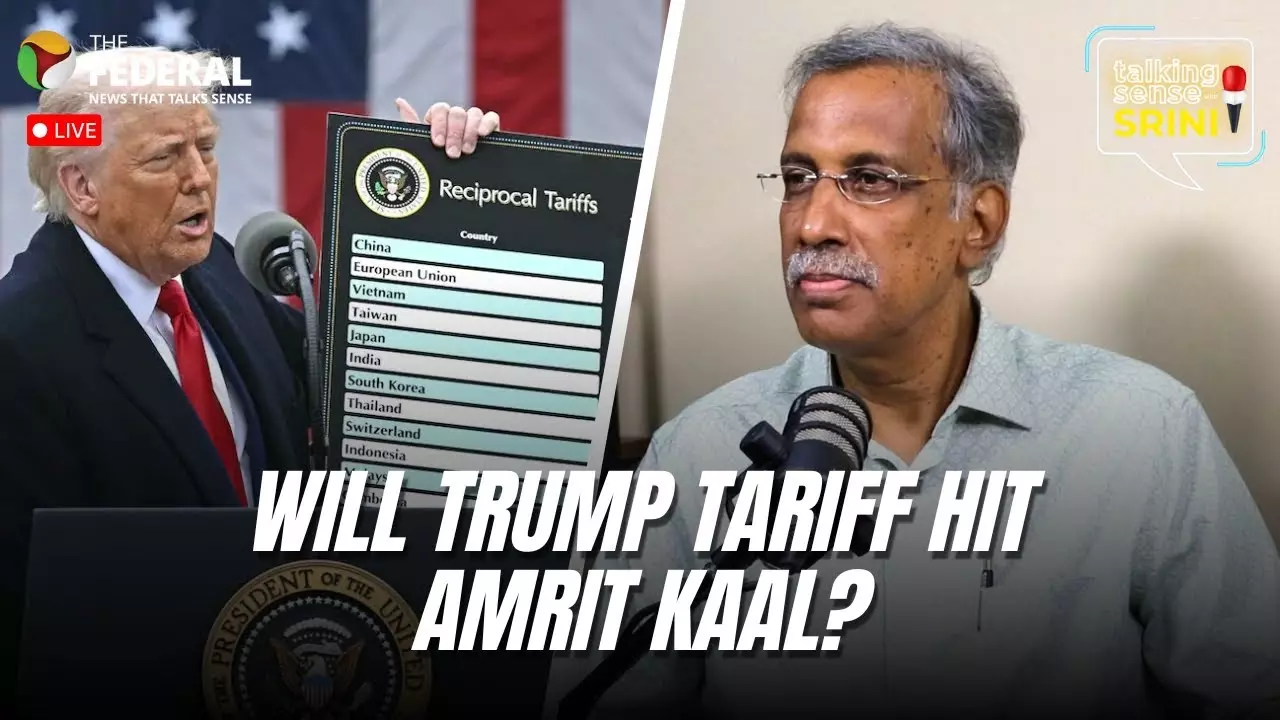
Is India immune to Trump's tariff tirade?
In this edition of Talking Sense with Srini, The Federal's Editor-in-Chief S Srinivasan delves into the potential impact of Trump's tariffs on Indian economy

In a dramatic move with global ramifications, US President Donald Trump has imposed sweeping tariffs, including a 27 per cent levy on Indian exports. Joining from New Delhi, the Editor-in-Chief of The Federal, S Srinivasan discusses the fallout of the tariffs on Talking Sense with Srini.
As the world scrambles to make sense of the move, India, like many other nations, is weighing the economic shock and strategising its response.
Trump’s announcement has thrown bureaucracies and businesses into turmoil. “What Trump has done has thrown everybody into a tailspin,” Srinivasan said, adding that India’s trade officials are still hopeful of a possible deal. But that door may now be closing rapidly.
Also read: Donald Trump's 27% tariff on India: Impact on Indian economy
'Mixed bag'
India has attempted to present a measured reaction, terming the situation as a “mixed bag.” Srinivasan noted that New Delhi has historically taken a “play-it-down” approach with the US, especially on contentious issues like deportations and visas.
However, this time, the stakes are higher. “Even if there was a country which had zero tariff, now it will be 10 per cent. On top of that, the Indian tariff is going to be 27 per cent,” he pointed out. The sudden escalation has caught many off guard, including allies and adversaries alike.
Global shockwaves
The move is being compared to an economic nuclear bomb. Post-World War II institutions like the WTO were created to ensure rules-based global trade. Trump’s action, Srinivasan warned, risks undoing decades of international cooperation.
Also read: Trump's tariffs send US stocks into a spiral, Dow Jones down by 1,600 points
European media, he noted, are likening this to protectionist policies last seen in the 17th century. “It’s as though he’s thrown everything to the winds,” Srinivasan remarked. The “Make America Great Again” rhetoric has created a protectionist wall around the US, he added.
Unilateralism vs Multilateralism
The unpredictability of Trump’s strategy has unnerved global markets. Analysts had hoped this was just a bargaining tactic. “End of the day, maybe he’ll come around to deal-making,” Srinivasan said, echoing a theory that Trump seeks chaos only to later strike deals on his own terms. But the international community is skeptical.
Also read: India faces selective trade headwinds from US tariff impact, apparel sector most hit
“All politicians enjoy looking through their side mirror, telling people how great they were,” quipped Srinivasan, drawing a parallel between the US and India’s own nostalgia-driven narratives.
Strategic Risks Ahead
Traditional allies like Japan, Germany, and South Korea have also been hit. “If partners like Vietnam and Taiwan are slapped with tariffs, won’t they look towards China?” Srinivasan asked. The risk is that US allies may pivot away from Washington and form new trade alliances.
Rather than bringing manufacturing back to the US, global firms may just relocate to low-tariff nations, possibly in Africa. “There are various ways in which the world might think,” he said, emphasising that Trump’s assumption of reshoring US industry could very well backfire.
An incoming recession?
The domestic impact in the US could be severe. “Economists are completely aghast… nobody has given a thumbs up,” Srinivasan noted. Inflation could double from 2 per cent to 4 per cent, and a recession may be imminent.
“This may be the first time a president has imported a recession,” Srinivasan said wryly, referring to economists’ reactions to the potential downturn triggered by rising consumer costs and global retaliation.
India’s growth ambitions hit
India, with aspirations to become the third-largest global economy and a high-income nation by 2047, faces a hurdle. “India is not an export-led economy, but still, a 0.7 per cent GDP hit is a major setback,” Srinivasan warned.
Despite exports forming only 1.8 per cent of India’s GDP, key sectors like manufacturing will be affected. But there's a silver lining: “Our neighbours like Vietnam and Bangladesh have been slapped with even higher tariffs, so relatively we could become more competitive.”
India’s service exports remain strong, and officials may explore newer markets. “We should quickly find ways where we become more competitive than these countries,” Srinivasan emphasised.
Yet, the overall sentiment remains cautious. “It is going to have a serious impact on sentiments. The stock markets will react. The long-term targets will be affected,” he concluded, signaling that the path to becoming a global economic powerhouse just got bumpier.
The content above has been generated using a fine-tuned AI model. To ensure accuracy, quality, and editorial integrity, we employ a Human-In-The-Loop (HITL) process. While AI assists in creating the initial draft, our experienced editorial team carefully reviews, edits, and refines the content before publication. At The Federal, we combine the efficiency of AI with the expertise of human editors to deliver reliable and insightful journalism.

